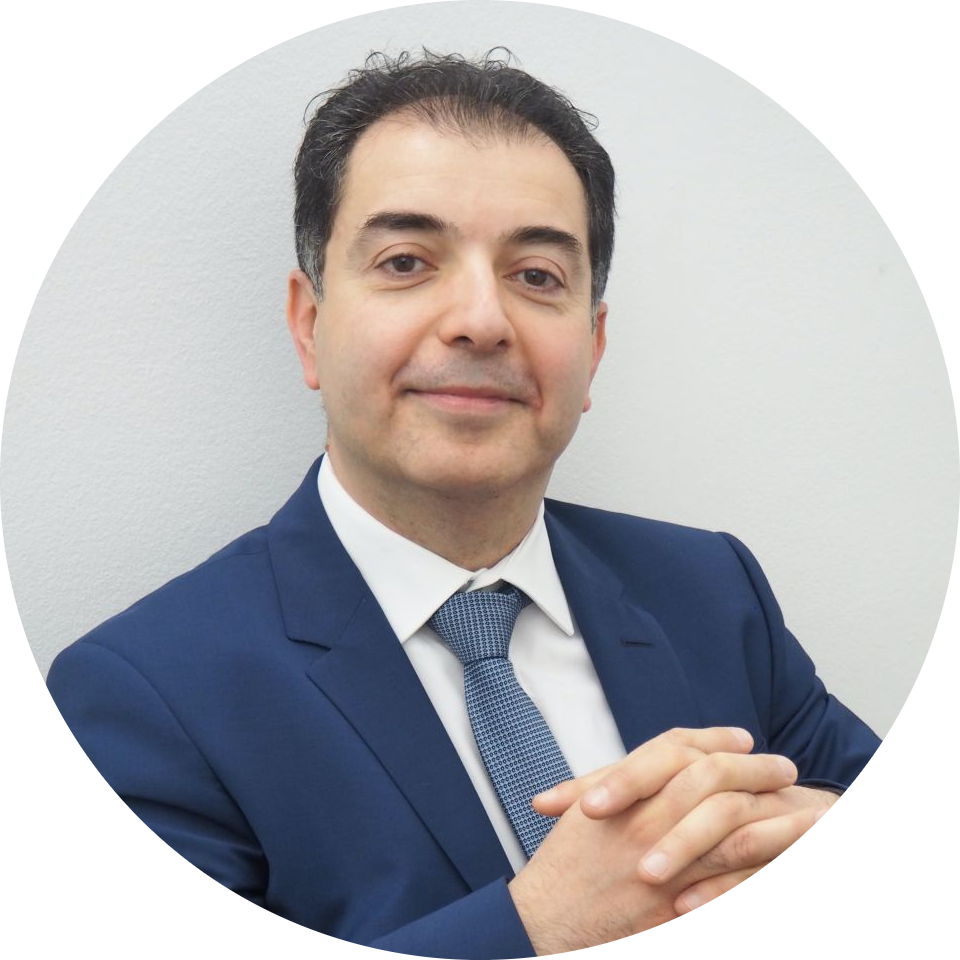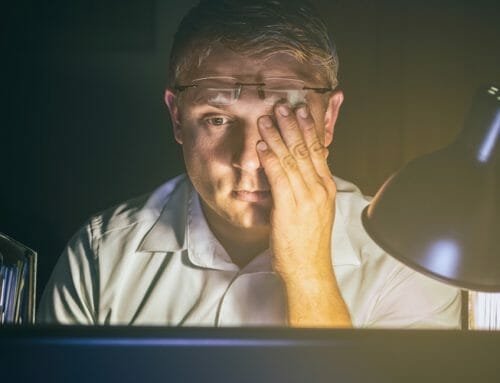Myopia Vs Hyperopia: What’s The Difference?
Having an active and fulfilling life can often be affected by a number of factors, including restricted vision. This can tremendously impact the quality of your life, not only by stopping you from participating in activities you enjoy doing but also by compromising your ability to complete basic daily tasks.
Myopia and Hyperopia are two of the most common causes of poor vision. They are refractive errors, meaning that your eyes are not correctly focusing light on the retina, causing long- or short-sightedness. Both conditions affect your ability to see correctly. Myopia makes it harder to see things in the distance (short-sightedness), while Hyperopia makes it harder to see things close up (long-sightedness). These two conditions are predominantly hereditary and can only occur as the result of a birth defect when the eyeball is shaped in a specific way. However, people with Myopia, especially children, may aggravate the condition by focusing on too much close-up work and not spending enough time outside.
Since Myopia and Hyperopia are common conditions, there are a variety of high-quality solutions to the problem. These include prescription glasses, contact lenses, and refractive surgeries such as laser eye surgery or Implantable collamer lenses (known as implantable contact lenses ICL). This blog post will discuss Myopia and Hyperopia, the differences between the two, symptoms, and treatments.
What Is Myopia?
Myopia, also known as short-sightedness, is a condition when an image of a distant object becomes focused in front of the retina, making distant objects appear blurry, out of focus. This refractive error is caused by the elongated shape of the eyeball or because the refractive power of the eye is too strong. As a result, someone with Myopia will have no trouble seeing objects and reading text within close reach but will have difficulty performing certain activities that require an ability to see far away, such as driving, watching television, or playing sports.
Myopia affects around 20 million Britons, that is as many as one in three adults in the UK. There are 137 million Americans known to suffer from the condition in the USA. And according to the World Health Organisation by 2050 more than half of the global population could be suffering from Myopia as a result of increased time spent indoors and spending too much time doing close-up work.
Myopia often runs in families, and having a parent with the condition increases the chances of a child is also affected. Most people are diagnosed with Myopia as children, and the condition may deteriorate throughout adolescence. By the time the patient reaches their mid-20s, the condition will usually stabilise, though it may continue to worsen depending on their lifestyle during their adulthood.
What Is Hyperopia?
Hyperopia, as opposed to Myopia, is a condition when an image of distant objects becomes focused behind the retina, creating a refractive error by making objects close up appear blurred and out of focus. This refractive error occurs because of the flattened or shortened shape of the eyeball, the abnormal shape of the cornea, as well as the weakening of the ciliary muscles. And will cause difficulty in completing certain daily tasks close up without the help of glasses, such as reading or working on the computer. This often results in overstraining eye muscle, leading to tired eyes and headaches, squinting and Amblyopia also called a lazy eye.
Various age groups are affected by Hyperopia. Children with this condition often outgrow it over time. Although it is prevalent in people of all ages, statistically speaking it is most prevalent in people aged 40 and older. When it comes to treating Hyperopia, glasses, contact lenses, or any type of refractive surgery including laser eye surgery are often successful options.
Symptoms Of Myopia And Hyperopia
The most common symptom of each condition is blurred vision, whether in objects nearby or far away.
With Myopia (short-sightedness), symptoms can include:
- Blurry vision at a distance
- Difficulty driving, especially at night
- Squinting
- Eyestrain
- Headaches
Symptoms of Hyperopia (long-sightedness) can include:
- Blurry vision when concentrating on near objects or tasks
- Difficulty reading
- Eyestrain
- Squinting
- Accommodative Dysfunction
- Headaches
Although Myopia and Hyperopia are two different conditions, many of the symptoms are similar. Both types of vision errors are linked to genetics, and many individuals with close family members suffering from the condition will also develop it at some stage in their lives.
Myopia Vs Hyperopia
One of the key differences between these refractive errors is in the process of image formation, which occurs in front of the retina in the myopic eye, and behind the retina in the hyperopic eye. This occurs because of the difference in eyeball shapes.
In the myopic eye, the eyeball becomes elongated, causing the focal length of a lens to decrease, resulting in difficulty seeing objects afar, as opposed to shortened hyperopic eye shape with an increased focal length of a lens, resulting in blurry near vision.
Treatment Of Myopia And Hyperopia
There are a number of treatments that can effectively correct Myopia and Hyperopia, including both surgical and non-surgical options. Since they both can impact the patient’s quality of life, it is crucial to find the right treatment option that allows the patient to go about their day-to-day lives normally.
The main non-surgical treatments for Myopia and Hyperopia include:
- Prescription glasses can help to correct a refractive error by altering the direction of the light rays onto the retina, giving you a perfect, clear image. When you have Myopia, the glasses will diverge the light rays so that the eyes aren’t focused so much on them, which allows the light to reach the retina, whereas glasses for Hyperopia will increase eyes focusing power thus enabling the light rays to stop at the focal point by the time it reaches the retina.
- Contact lenses are often a simple solution for correcting the refractive errors in Myopia and Hyperopia. Similarly, Myopia will be corrected through the concave lens (diverging lens), which has negative refractive power, by reducing the refraction of the light and extending the focal length. And Hyperopia will be corrected through the convex lens (converging lens), which has a positive refractive power, by bending parallel passing light rays inward and letting them meet at the focal point. Contact lenses have many advantages, are lightweight and invisible, unlike prescription glasses. However, the use of contact lenses is the most common cause of eye infections, leading to compromised ocular surface, dry eye diseases, cornea scarring, further leading to decreased vision, as often seen in our patients at Eye Clinic London.
Surgical treatments for the conditions include:
- laser eye surgery is a type of refractive surgery aiming to improve eye vision by reshaping the cornea (the window of the eye) with a laser beam, thus giving the eye the ability to focus more clearly. This is a safe and permanent solution that instantly gives you a better quality of life by eliminating the need to use prescription glasses or contact lenses, although, with the ageing process of a natural lens, other solutions can be attained in the future.
- Lens implants Implantable Collamer/Contact Lenses is another type of refractive surgery aiming to improve eye vision, specifically for patients with a higher prescription. This surgery can correct vision for patients who aren’t suitable for Laser eye surgery as a result of other underlying eye conditions e.g. compromised cornea and ocular surface or dry eye disease.
There are two main types of laser eye surgery treatment available:
- Photorefractive keratectomy (PRK)
- Laser in situ keratectomies (LASIK)
LASIK and PRK both produce similar results, although LASIK is typically preferred more since the recovery period is shorter and there is little likelihood of postoperative pain.
When To See An Ophthalmologist
If you’re experiencing issues with your eyesight, it is vital to get it checked out by a professional ophthalmologist. Necessary assessments of the eyes will be carried out in the clinic to ensure that you will get the correct treatment for the eye condition and concerns you might have with various options available at Eye Clinic London so you can enjoy life to the fullest with the best vision possible. If you want to know more and ensure your eye health and eyesight are the best they can be, book a consultation here at Eye Clinic London today.
Share This Story, Choose Your Platform!
Suffering from dry eyes?
Take our 2-minute online dry eye assessment to see if we can help alleviate your symptoms and tackle your condition
Our most popular treatments
What our patients say…
“As soon as I met Mr Hamada, I knew I was in safe hands. He is an expert in his field, and very reassuring. His work was impeccable, and I would thoroughly recommend him to anyone wanting a professional, kindly, expert service.”
“I came all the way from the US to be evaluated by Mr. Samer Hamada who provided me with a world-class experience. I was treated with technology that doesn’t exist in the United States. My vision improved significantly since the surgery. Mr. Samer Hamada is definitely a Keratoconus expert.”
“I am glad to be with Mr Hamada. I am glad to be examined by Mr Hamada who acts responsibly and professionally. I never had this experience before from a previous ophthalmologist. I am thankful to Mr Hamada for the successful diagnosis and treatment of my case.”
“What a Consultant. Dr. Hamada is a man who was born for this profession. As soon as we walked into the room you felt that you had met a man who was gentle and kind. His demeanour was of a man who knew his trade. He speaks in a way that you will understand. He explains exactly what is wrong and the way he will help fix it for you.”
“Mr Hamada’s London Eye Care and his team are a delight. Nothing was too much trouble and the help, support, advice and guidance before during and after the surgery was all world class. I have worn glasses since the age of 13 years and had the onset of cataracts for the last five so it has all been very much a life changing experience to be free from glasses once more.”
“Mr Hamada, his assistant Joanna and his ophthalmic technicians provide a caring, efficient and high quality service. From the admin through to the surgical aftercare we were very well looked after and we had a high degree of confidence in Mr Hamada’s abilities. Our daughter’s cataracts have been corrected (under general anaesthetic) and her quality of life has improved substantially. You also feel well cared for throughout – the human touch is vital in healthcare, but not always delivered, so well done and thanks to all of the team.”
“We were referred to Dr.Hamada by one of the UK experts. The expert himself admitted that Dr.Hamada was better than him!! We were not disappointed at all. Dr. Hamada was excellent with my child. His communication skills and knowledge were exemplary. He gave us clear management plan and would not hesitate to recommend him.”
“Dr Hamada is an excellent, highly competent doctor with a very kind and sympathetic manner. His reputation for successfully treating dry eye patients seems unparalleled. His team are all extremely friendly and helpful, especially Dr Hamada’s PA Joanna, making the overall experience better than anywhere else I’ve been!”
“Appointment setting and follow-up were very efficient and well managed. Mr Hamada was kind, reassuring, knowledgeable and had a very warm manner with my young son, making him instantly feel at ease. I feel that we can trust him and that he will finally be able to solve my son’s long-term eye problems that have stumped other eye doctors.”
We have replaced some of the images of real patients who provided these testimonials to protect their privacy.

About the expert
Mr Hamada | Consultant Ophthalmologist and Corneal Surgeon
MD, MSc, DO (hons), FRCSEd, FRCOphth I am Samer, founder and consultant ophthalmic surgeon with over 20 years’ experience in ophthalmology. I am a world-renowned specialist in cornea, cataract and refractive surgery. I’m not only a leading surgeon but also the only dual fellowship trained in corneal diseases in children from reputable institutions in the UK. At Eye Clinic London I work closely with other consultant ophthalmologists, optometrists and orthoptists to achieve the best outcomes for our patients. Our main aim is to make sure our patients get the safest and best treatments available to them. We put your safety before anything else so you can rest assured that if you choose us you will be in the best and safest hands.












